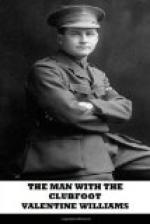My companion was a bright, amusing fellow and delightfully typical of his class. He had seen a year’s service with the cavalry on the Eastern front, had been seriously wounded and was now attached to the General Staff in Berlin in what I judged to be a decorative rather than a useful capacity, for, apart from what he had learnt in his own campaigning he seemed singularly ignorant of the development of the military situation. Particularly, his ignorance of conditions on the Western front was supreme. He was full to the brim with the most extraordinary fables about the British. He solemnly assured me, for example—on the faith of a friend of his who had seen them—that Japanese were fighting with the English in France, dressed as Highlanders—his friend had heard these Asiatic Scotsmen talking Japanese, he declared. I thought of the Gaelic-speaking battalions of the Camerons and could hardly suppress a smile.
Young von Boden was superbly contemptuous of the officers of the obscure and much reduced infantry battalion doing garrison duty at Goch, the frontier station we had just left, where—as he was careful to explain to me—he had spent four days of unrelieved boredom, waiting for me.
“Of course, in war time we are a united army and all that,” he observed unsophistically, “but none of these fellows at Goch was a fit companion for a dashing cavalry officer. They were a dull lot. I wouldn’t go near the Casino. I met some of them at the hotel one evening. That was enough for me. Why, only one of them knew anything at all about Berlin, and that was the lame fellow. Now, there is one thing we learn in the cavalry....”
But I had ceased to listen. In his irresponsible chatter the boy used a word that struck a harsh note which went jarring through my brain. He had mentioned “the lame fellow,” using a German word “der Stelze.” In a flash I saw before me again that scene in the squalid bedroom in the Vos in’t Tuintje—the candle guttering in the draught, the livid corpse on the floor and that sinister woman crying out: “Der Stelze has power, he has authority, he can make and unmake men!”
The mind has unaccountable lapses. The phrase had slipped out of my German vocabulary. I had not even recognized it until the boy had rapped it out in a context with which I was familiar and then it had come back. With it, it brought that tableau in the dimly lit room, but also another—a picture of a vast and massive man, swarthy and sinister, with a clubfoot, limping heavily after Karl, the waiter, on the platform at Rotterdam.
That, then, was why the young lieutenant had glanced down at my feet at the station at Goch, The messenger he had come to meet, the bearer of the document, the man of power and authority, was clubfooted, and I was he!




